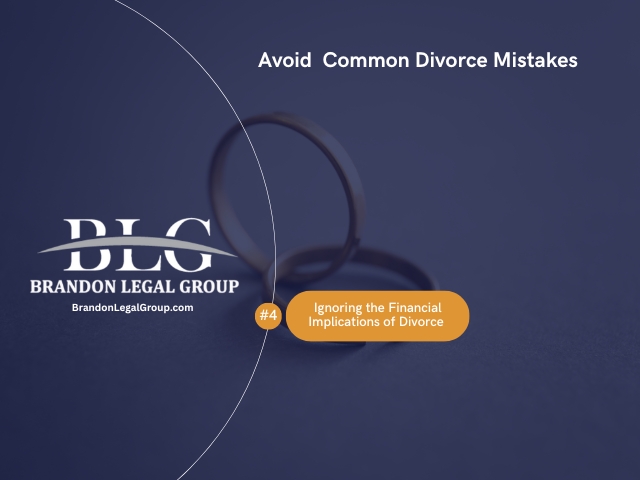 Divorce is not only an emotional journey but also a significant financial transition. Unfortunately, many individuals make the mistake of overlooking the long-term financial implications during divorce proceedings. By failing to consider the economic impact of their decisions, they may encounter financial struggles post-divorce. This article will explore the importance of consulting financial professionals, understanding tax implications, and providing a fictional example to highlight the consequences of neglecting long-term financial considerations.
Divorce is not only an emotional journey but also a significant financial transition. Unfortunately, many individuals make the mistake of overlooking the long-term financial implications during divorce proceedings. By failing to consider the economic impact of their decisions, they may encounter financial struggles post-divorce. This article will explore the importance of consulting financial professionals, understanding tax implications, and providing a fictional example to highlight the consequences of neglecting long-term financial considerations.
Overlooking Long-Term Financial Implications
Consulting Financial Professionals:
One of the critical steps to avoid overlooking long-term financial implications is to consult financial professionals who can provide valuable insights and guidance throughout the divorce process.
Explanation of the Importance
Financial experts, such as financial planners, accountants, or forensic specialists, possess the knowledge and expertise to assess the economic impact of decisions made during divorce proceedings. They can help individuals understand the value of assets, uncover confidential financial information, and analyze the long-term consequences of different settlement options. As a result, individuals can make informed choices that protect their economic well-being by involving financial professionals.
Fictional Example: To illustrate the importance of consulting financial professionals, let’s consider the case of John. In his divorce, John did not seek the assistance of a financial planner and relied solely on his understanding of his financial situation. As a result, he undervalued certain assets and underestimated the long-term financial implications of the settlement. Post-divorce, John faced financial struggles and realized that his lack of financial expertise had led to unfavorable outcomes. As a result, he discovered that he needed to prepare for his current financial responsibilities. This fictional example highlights the significant impact of overlooking financial implications and the importance of seeking professional financial guidance during a divorce.
Considering Tax Implications
Another crucial aspect of addressing long-term financial implications is understanding the tax consequences of various financial decisions made during the divorce process. It is essential to consult with a tax professional or a knowledgeable family law attorney to navigate the complex
By proactively considering tax implications, individuals can make informed decisions that minimize potential tax burdens and help secure their financial future post-divorce.
Highlighting the Significance
Divorce often involves dividing assets, transferring property, and adjusting financial arrangements. Each action can have tax implications that may significantly affect an individual’s financial situation. Understanding these implications is essential to make informed decisions and optimize one’s financial position.
Fictional Example:
In contrast to John’s situation, Lisa took a proactive approach by consulting a tax professional during her divorce. The tax professional provided insights into the tax consequences of different settlement options, allowing Lisa to make informed choices that would optimize her financial situation. By understanding the tax implications of various financial decisions, Lisa could strategize and structure her settlements to minimize her tax burden. This allowed her to retain more assets and set herself up for a stronger financial future post-divorce.
Dividing Retirement Assets
Divorce often involves dividing retirement assets, such as pensions, 401(k)s, and IRAs. Failing to consider the long-term implications of dividing these assets can have significant financial consequences.
Understanding Retirement Account Rules 
Each retirement account has its own rules and regulations regarding division in divorce. It is crucial to understand these rules to make informed decisions about the division of retirement assets. Again, consulting with a financial professional or retirement specialist can provide valuable guidance.
Assessing the Tax Consequences
Dividing retirement assets can have tax implications. Therefore, understanding the tax consequences associated with separating retirement accounts is essential. For example, withdrawals from certain accounts may be subject to early withdrawal penalties or tax liabilities. Awareness of these implications can help individuals make informed choices that minimize tax burdens.
Fictional Example: John and Lisa had a significant amount of retirement assets accumulated during their marriage. When dividing these assets, they initially focused solely on the current value of the accounts. However, they failed to consider the tax consequences associated with the division. After seeking guidance from a financial professional, John and Lisa learned that dividing retirement assets without considering the tax implications could result in unexpected tax liabilities. With this insight, they adjusted their approach and worked together to create a division plan that minimized tax consequences and ensured a fair distribution of their retirement assets.
Establishing a Post-Divorce Financial Plan
Creating a post-divorce financial plan is another critical aspect of avoiding long-term financial pitfalls. This plan involves taking stock of one’s financial situation, setting financial goals, and developing a budget that aligns with those goals.
Assessing Financial Needs
After divorce, individuals may experience significant changes in their financial circumstances. Therefore, assessing one’s financial needs and creating a comprehensive budget that considers living expenses, child support, spousal support, and long-term financial goals is crucial.
Building an Emergency Fund
Building an emergency fund is essential for financial stability post-divorce. An emergency fund is a safety net for unexpected expenses and can help individuals navigate economic challenges more easily.
Reevaluating Insurance Coverage
Divorce often necessitates reevaluating insurance coverage, including health, life, and property insurance. Reviewing and updating insurance policies to ensure adequate coverage and protection is essential.
Fictional Example: John recognized the need to establish a post-divorce financial plan after his divorce. He carefully assessed his financial needs, factoring in living expenses, child support, and long-term goals such as saving for his children’s education. He created a budget that allowed him to meet his financial obligations while setting aside funds for savings and emergencies. Additionally, John reevaluated his insurance coverage, updating policies to reflect his new circumstances. As a result, he secured health insurance for himself and his children, adjusted his life insurance beneficiaries, and ensured adequate property insurance coverage.
Conclusion
Overlooking the long-term financial implications of divorce can have significant consequences. However, individuals can avoid common pitfalls and secure a stronger financial future by consulting financial professionals, understanding tax implications, and creating a post-divorce financial plan. However, by consulting financial professionals, understanding tax implications, dividing retirement assets strategically, and establishing a post-divorce financial plan, individuals can avoid financial pitfalls and make informed decisions that protect their economic well-being. Dividing retirement assets and considering tax consequences are crucial to protecting one’s financial well-being.
Additionally, establishing a post-divorce financial plan allows individuals to assess their financial needs, build an emergency fund, and reevaluate Insurance coverage. Individuals can establish a solid foundation for their post-divorce financial stability by addressing these areas. Remember, divorce is not only an emotional process but also a financial one. By avoiding overlooking long-term financial implications, individuals can confidently navigate their divorce journey and set themselves up for a more secure financial future.
